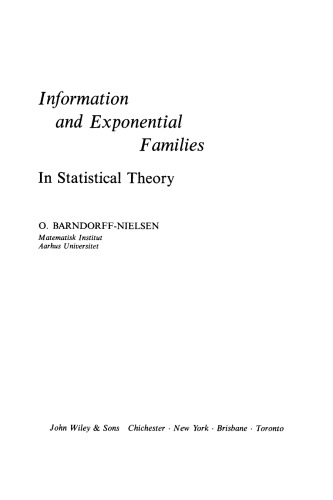

Most ebook files are in PDF format, so you can easily read them using various software such as Foxit Reader or directly on the Google Chrome browser.
Some ebook files are released by publishers in other formats such as .awz, .mobi, .epub, .fb2, etc. You may need to install specific software to read these formats on mobile/PC, such as Calibre.
Please read the tutorial at this link. https://ebooknice.com/page/post?id=faq
We offer FREE conversion to the popular formats you request; however, this may take some time. Therefore, right after payment, please email us, and we will try to provide the service as quickly as possible.
For some exceptional file formats or broken links (if any), please refrain from opening any disputes. Instead, email us first, and we will try to assist within a maximum of 6 hours.
EbookNice Team

Status:
Available5.0
33 reviews
ISBN 10: 1118857283
ISBN 13: 9781118857281
Author: Ole E Barndorff Nielsen
First published by Wiley in 1978, this book is being re-issued with a new Preface by the author. The roots of the book lie in the writings of RA Fisher both as concerns results and the general stance to statistical science, and this stance was the determining factor in the author's selection of topics. His treatise brings together results on aspects of statistical information, notably concerning likelihood functions, plausibility functions, ancillarity, and sufficiency, and on exponential families of probability distributions.
CHAPTER 1 INTRODUCTION
1.1 Introductory remarks and outline
1.2 Some mathematical prerequisites
1.3 Parametric models
Part I Lods functions and inferential separation
CHAPTER 2 LIKELIHOOD AND PLAUSIBILITY
2.1 Universality
2.2 Likelihood functions and plausibility functions
2.3 Complements
2.4 Notes
CHAPTER 3 SAMPLE-HYPOTHESIS DUALITY AND LODS FUNCTIONS
3.1 Lods functions
3.2 Prediction functions
3.3 Independence
3.4 Complements
3.5 Notes
CHAPTER 4 LOGIC OF INFERENTIAL SEPARATION. ANCILLARITY AND SUFFICIENCY
4.1 On inferential separation. Ancillarity and sufficiency
4.2 B-sufficiency and B-ancillarity
4.3 Nonformation
4.4 S-, G-, and M-ancillarity and -sufficiency
4.5 Quasi-ancillarity and Quasi-sufficiency
4.6 Conditional and unconditional plausibility functions
4.7 Complements
4.8 Notes
Part II Convex analysis, unimodality, and Laplace transforms
CHAPTER 5 CONVEX ANALYSIS
5.1 Convex sets
5.2 Convex functions
5.3 Conjugate convex functions
5.4 Differential theory
5.5 Complements
CHAPTER 6 LOG-CONCAVITY AND UNIMODALITY
6.1 Log-concavity
6.2 Unimodality of continuous-type distributions
6.3 Unimodality of discrete-type distributions
6.4 Complements
CHAPTER 7 LAPLACE TRANSFORMS
7.1 The Laplace transform
7.2 Complements
Part III Exponential families
CHAPTER 8 INTRODUCTORY THEORY OF EXPONENTIAL FAMILIES
8.1 First properties
8.2 Derived families
8.3 Complements
8.4 Notes
CHAPTER 9 DUALITY AND EXPONENTIAL FAMILIES
9.1 Convex duality and exponential families
9.2 Independence and exponential families
9.3 Likelihood functions for full exponential families
9.4 Likelihood functions for convex exponential families
9.5 Probability functions for exponential families
9.6 Plausibility functions for full exponential families
9.7 Prediction functions for full exponential families
9.8 Complements
9.9 Notes
CHAPTER 10 INFERENTIAL SEPARATION AND EXPONENTIAL FAMILIES
10.1 Quasi-ancillarity and exponential families
10.2 Cuts in general exponential families
10.3 Cuts in discrete-type exponential families
10.4 S-ancillarity and exponential families
10.5 M-ancillarity and exponential families
10.6 Complement
exponential families in theory and practice
facebook information systems
3 facts about exponential functions
the exponential family worksheet answer key
list of exponential family distributions
the exponential family worksheet answers
Tags: Ole E Barndorff Nielsen, Exponential, Families